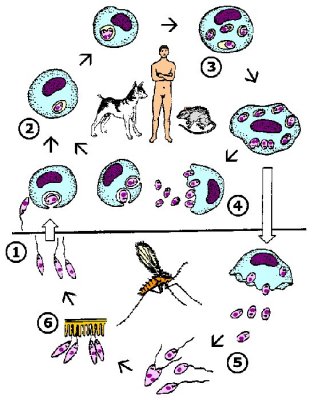

1.Metacyclic promastigotes are transferred to the vertebrate host as the sand fly takes a blood meal.
2.The promastigotes are phagocytosed by macrophages and transform into amastigotes.
3.The amastigotes undergo repeated cycles of binary fission within the macrophage.
4.Amastigotes are released from the infected macrophage and re-initiate the replicative cycle in new macrophages.
5.If taken up by a sand fly the amastigotes convert to promastigotes and undergo binary fission. These procyclic promastigotes adhere to the gut epithelium to avoid being excreted.
6.The procyclic promastigotes quit dividing and undergo a terminal differentiation into metacyclic promastigotes which are infective for the vertebrate host.
